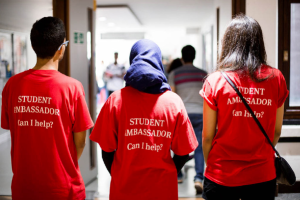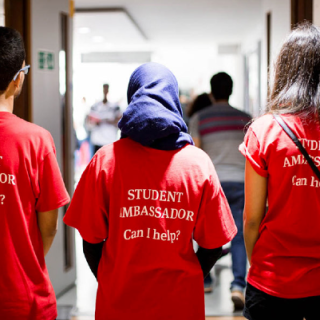
Christianah Babajide is in her first year of the LLB at City and holds the position of Secretary of the City University Law Society. Christianah also writes for LawCommonRoom, the blog she started with fellow LLB1 student Radha Baan. In this piece she reports back on an evening with two graduates of the City LLB programme…
Are you considering a future in law?
Would you like to know the ins-and-outs of passing your law degree and find out what really happens after you graduate?
Then you are in the right place, whether or not you stumbled upon this article accidentally.
On the 1st of February 2016, City’s LLB1 students were fortunate enough to hear from two law graduates, who shared examination tips and work experience advice on completing the LLB.
| Speakers: | Rabah Kherbane (Barrister) | Selda Krasniqi (Solicitor) |
| Current: | BPTC student | LLM student |
| Degree: | First Class Honours Law Graduate | 2:1 Law Graduate |
| Scholarship: | The Honourable Society of the Inner Temple | UCL |
| Interests: | Human Rights and International Law | International Law |
Rabah and Selda had many tips to share with us, here are the top four examination pointers:
1. Journal articles
You must quote, use and critically engage with academic literature during exams. It will improve your marks. In addition, Rabah recommended journals because they are ideal for finding concise summaries of complex areas of law – making it easier to comprehend.
2. Time management
This is key during an exam as it contributes to achieving high marks. Selda advised, “Make sure you allocate equal time to each question you answer as they are all worth exactly the same amount of marks.” For example, if you have three hours for three questions, move on to question two after the first hour.
3. Lectures
The core legal principles which you must learn for the exams are all contained in your handouts and lectures. It is important you attend all lectures and tutorials.
4. Signposting
Having an introduction which outlines what you are going to talk about in an essay, problem question, or coursework is very useful. Often students struggle with knowing how to get an essay started. This is where the technique of signposting comes in.
 Spell out what you are going to cover in the essay; this will act as a guide to you in writing the body of your essay, and will also help structure your answer to make it comprehensible for the examiner.
Spell out what you are going to cover in the essay; this will act as a guide to you in writing the body of your essay, and will also help structure your answer to make it comprehensible for the examiner.
Exclusive bonus tip: it is useful to use words from the question when writing your answer. This is to make sure you are constantly linking your points back to the actual question asked, and that your answer remains relevant.
The pair also spoke about many opportunities they engaged in during their law degrees and took us through those which were the most useful:
1. Citizens Advice Bureau (CAB)
This is a walk-in legal clinic for students to undergo training and be equipped with skills in order to advise members of the public. Selda has worked as a ‘Gateway Assessor’ for more than a year and recommended CAB because it teaches you key transferable skills you will need later in your law career. It can also lead up to you qualifying as an adviser.
2. Mini-pupillages and Vacation Schemes
Seek application advice through City’s Professional Mentor Scheme, City Careers’ and achieve the grades you are happy with before applying. Also, start at smaller places like high street firms or CAB, especially if you are in your first year.
3. Free Representation Unit (FRU)
Selda, who has worked for the FRU for more than 5 months, told us how FRU gives you the chance to represent real claimants in employment or social security cases. This is the best advocacy experience possible at the late LLB stage. It is important to keep this in mind, especially those who are leaning towards the Bar. Selda is trained to act on behalf of clients in social security law at Social Security Appeals Tribunal.
4. Student Ambassador
 This gives you a double benefit: you get the opportunity to represent your university and get paid. Rabah and Selda were both Ambassadors who were able to manage their degree workload due to the flexibility of the role.
This gives you a double benefit: you get the opportunity to represent your university and get paid. Rabah and Selda were both Ambassadors who were able to manage their degree workload due to the flexibility of the role.
They encouraged law students to get involved as it improves your confidence and public speaking. Rabah was able to master the art of speaking eloquently through being a student ambassador, a skill every aspiring Barrister needs.
5. Societies.
Rabah who is currently a Vice-President of the Debating Society at the Inner Temple, encouraged volunteering for the executive teams of societies. He urged students to get involved in debating because it will develop vital skills for a law career. Getting involved in societies shows that you can engage socially while in academia.
6. Lawbore.
Rabah, who has written for the Guardian Law section, urged us to take up the opportunity of blogging for Lawbore. He encouraged us to write varied pieces as it hones your writing skills and demonstrates a great interest in the law.
Snapshots of Experiences
The pair updated us on what they did in the six months after graduating…
1. Interviewing Non-Governmental Organisations (NGO) and government representatives to improve the use of technology in the Europe refugee crisis (LWOWX).
2. Work on the Radovan Karadzic Appeal Team at the International Criminal Tribunal for the former Yugoslavia in The Hague, Netherlands.
3. Working with Charities and NGOs in counter-terrorism, immigration, international development, national security and human rights law, from within the Joint Council on Welfare of Immigrants, Results UK, Amnesty International, Rights Watch etc.
My reflections of the day
Hearing all this from such successful City alumni was incredibly motivating: until this evening I had thought a First Class law degree was something out of my grasp, however, Rabah and Selda have made me realise it is not necessarily the time spent in the library which makes this happen, but the adoption of certain strategies – working smarter. I will certainly be using more journal articles within my essays and trying to ensure I consolidate my notes for lectures and tutorials in a timely fashion, so when it comes to revision, I am ready!
Many thanks to Rabah and Selda for allowing us to publish this article!


